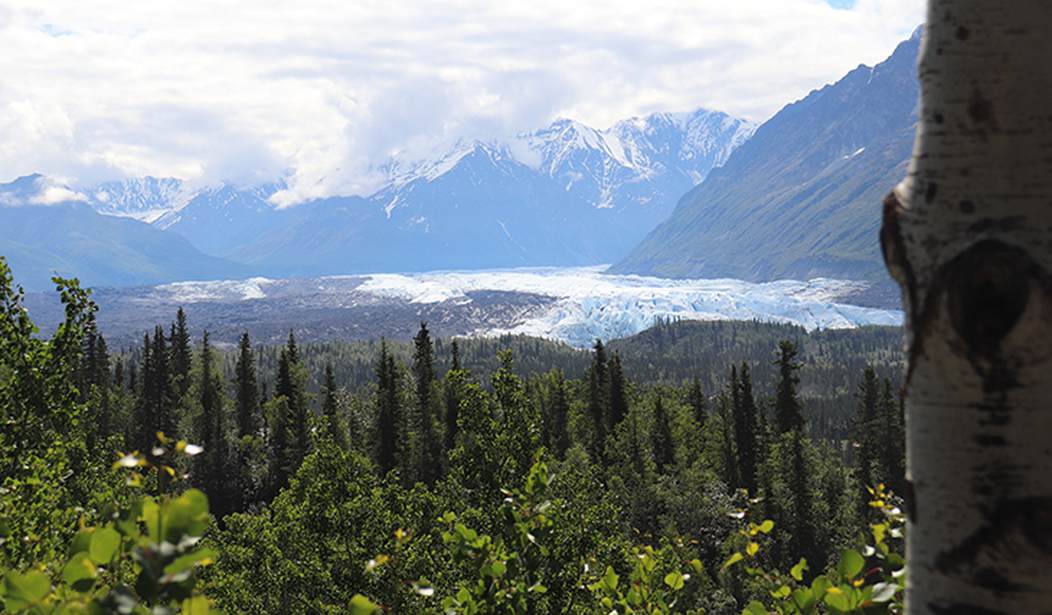Every cloud has a silver lining, sometimes a big one.
Here in Alaska and elsewhere, mountain glaciers have been retreating since the last Ice Age. That's part of the process, and, yes, human activity does have some effect, although I have always and will always argue that it's not enough to justify wrecking our modern lifestyle. And, as it happens, there's an upside to the retreat of these glaciers; in fact, there are several upsides. The retreating glaciers open up a lot of new wildlife habitat, as nothing much can live on an ice sheet. They could also expose billions of dollars in mineral deposits.
That's worth a little whining from the climate scolds. Alaska Public Media's Wesley Early recently spoke with reporter Max Graham on the topic, and Mr. Graham makes some interesting points.
So these are streams that maybe have been too cold and murky with glaciers right above them, and then as those glaciers pull back and contribute less to their flows, they're kind of warming and clearing up and turning into sort of havens, or just more productive salmon streams. And so you can kind of see both of these evolutions of the ecosystem there in the Coast Mountains playing out, you know, just depending on the topography and the geography.
Habitats come and habitats go, of course; they always have, and always will. At the peak of the most recent ice age, one could walk from Belgium to Britain, across a huge, grassy plain called Doggerland; this long-lost grassland supported herds of bison, reindeer, and mammoths, along with the wolves, cave lions, and people that preyed on them. Much of northern Asia was taken up by the mammoth steppe, a cold grassland environment that's all but gone now.
Those environments are gone, but new ones are opening up. Salmon will populate some of these rivers and streams, along with other fish species. New forests will spring up, and new riverine habitats that will be home to all manner of northern wildlife, from voles to bears. Ice sheets aren't a good habitat for much of anything, but lush river valleys sure are.
But wait! There's more!
The same kind of watersheds that salmon are moving into are also of interest to mining companies. And pretty much, as ice melts, new rock, new outcrops are being exposed, and there's interest in the new discoveries. Geologists are finding minerals that no one had ever seen before because they were buried beneath ice not long ago. And so I, in my reporting, identified at least 20 companies, mostly Canadian companies, mostly small, sort of junior mineral exploration companies, that actually are advertising snow and ice melt and receding glaciers in these mountains in their marketing materials and in their financial disclosures, or security disclosures, to investors saying, ‘We're discovering gold and copper in rocks that no one had seen, like three, four, five years ago.’
Gold and copper, and what else? Alaska, we already know, is a treasure trove of rare earth metals, most of which the United States now gets from China. China, in case anyone hasn't noticed, isn't exactly a staunch American ally. But Alaska? Now that we have an administration that doesn't see the Great Land as a gigantic, untouchable national park, we may be able to access some of these metals, along with any other resources.
Retreating glaciers could expose even more. It's hard to say how much value there is in these new valleys, but between Alaskan and Canadian deposits, it could be billions of dollars worth of resources.
See Also: Another Study Confirms: Antarctica Isn't Melting
Is Penguin Poo Promising Plummeting World Temps?
There are downsides to the retreating glaciers, as well, as a Swiss mountain village learned to their sorrow:
The Swiss village of Blatten has been partially destroyed after a huge chunk of glacier crashed down into the valley.
Although the village had been evacuated some days ago because of fears the Birch glacier was disintegrating, one person has been reported missing, and many homes have been completely flattened.
Blatten's mayor, Matthias Bellwald, said "the unimaginable has happened" but promised the village still had a future.
Not to sound heartless, but this would have happened regardless of what the United States and Canada do about possible troves of mineral wealth.
The earth has its cycles, and while humanity (as I have always written) does have an impact, it's not large enough, in the grand scheme of things, to surrender our modern technology-based lifestyle. And now, in mountain valleys in Alaska, Canada, and no doubt elsewhere, we are seeing not only uncovered mineral wealth but also miles of new riverine wildlife habitat. Miles upon miles of new fishing streams! New salmon rivers, new habitat for fish and land animals, more forests - forests are carbon sinks, remember? That's a good thing, even according to the climate scolds.
Every cloud has its silver lining. In this case, it's a silver lining that far outshines that cloud.















